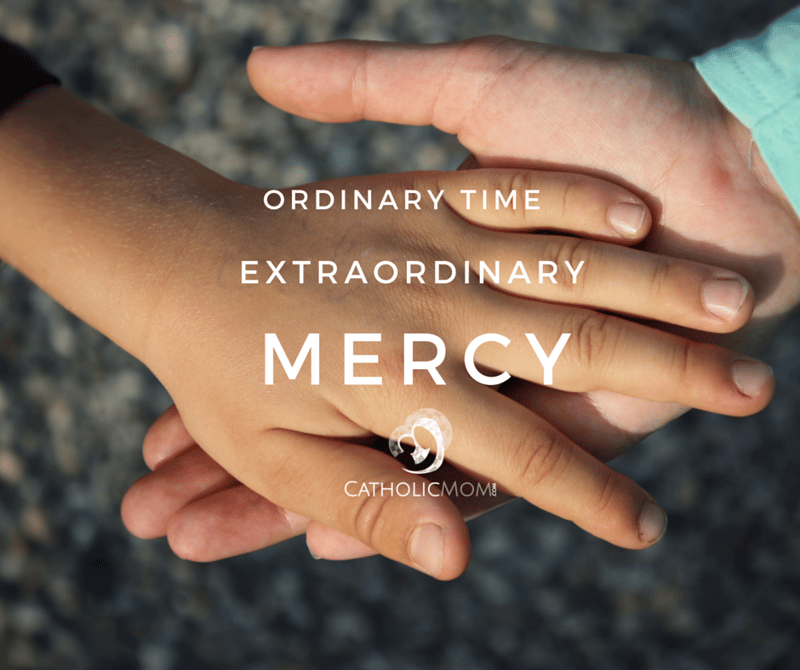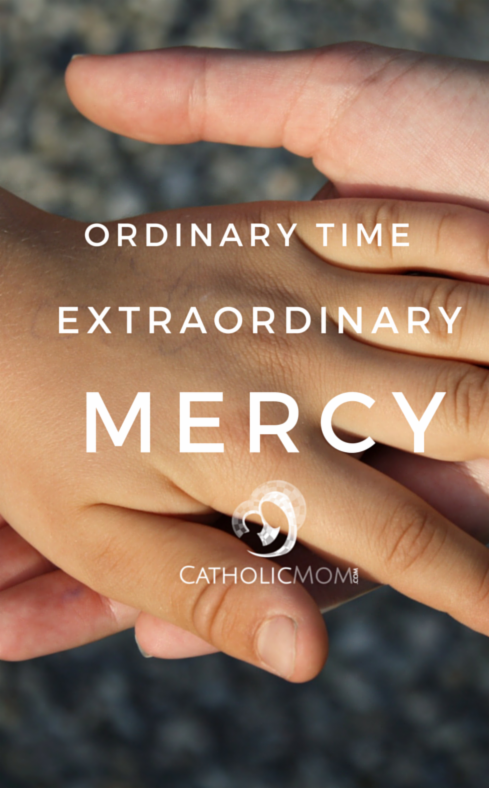This post is part of our Ordinary Time, Extraordinary Mercy series, in which CatholicMom.com contributors will share their own experiences of living the Year of Mercy. Beginning at Pentecost and continuing through the summer, we'll cover many aspects of the Works of Mercy in family life.
In How God’s mercy gave me a second chance, I wrote how reviewing my journals helps me recognize my mistakes and how God’s mercy works in healing my past. A lot of my sinful behavior was directed toward my older sister—and with good reason! But are those reasons still valid? We are no longer children, in fact, she is now in heaven, healed of all the emotional baggage that divided us. I’m the one left here to deal with my part of our mostly stormy relationship.
A couple of years ago I came to an entry in my journal describing one of our last sister days together. I felt the mercy of God overwhelm as I relived trip to visit her:
A difficult journey of mercy
I rest my head back and close my eyes, pretending to sleep to the drone of the plane, on its way to Palm Springs. I’m not looking forward to caring for my older sister Betty, who is recuperating from cancer surgery. I try not to give into the fear that we will slip back into the dreaded big-sister-dominating-the-little-sister roles. Our dysfunctional relationship, although healing since our mother’s death, still has echoes of past pitfalls.
Our parents raised their three girls (I’m the middle one) in a church-going Protestant family. As adults, we don’t agree on politics, abortion, gay marriage or the Eucharist. Betty talks about her latest New Age book. Past conflicts remind me not to challenge her theology with Catholic doctrine. My younger sister tries to keep her Christian Science beliefs to herself. We have our childhood in common. We can talk about our mother, and better days gone by.
When I saw the need to help my sister, I agreed. Then I cried out to the Lord to give me compassion and grace. He consoles me, empowering me with an almost audible message that surprises me, “Be at peace; my mercy is with you.” Why mercy and not grace? Maybe because today begins our family’s Divine Mercy Novena. I cling to God’s mercy.
Ask for whatever you want
Recent Mass readings remind me that Jesus is the vine, and I must remain attached to him, for without him, I can do nothing. The promise of bearing much fruit to glorify the Father carries the added promise to “ask for whatever you want and it will be done for you.” (See John 15:1-8.)
I’m asking that Betty will feel the love of God. I trust she will feel loved if I stay attached to the vine; that is, to God’s presence and mercy. I pray, “Lord, I have no mercy of my own. I can only give her the love and mercy you fill me with and let it overflow to my big sister.”
[Tweet "Lord, I have no mercy of my own. I can only give the mercy you fill me with. By @NancyNCWard"]
He reminds me that many, many people are obedient to the Lord in showing his love to me. I can do the same for Betty – without expecting reciprocation, knowing I can’t outgive God.
I arrive to find a different Betty than the one I last visited almost a year ago. She is grateful, disciplined, considerate, brave and patient. No longer fiercely independent. Cancer will do that. She is recovering from a double mastectomy and needs her two sisters and a cousin to take turns caring for her at home.
I transition to the responsibilities of meals, medication and housework that my younger sister has managed the past few days. These are comfortable duties, but not the bathing. I help Betty into the shower. She laughs at my faded bathing suit. She washes what she can reach. Then I step into the shower with her. I wash her back, legs and feet, working around the tubes still draining fluid as a result of her mastectomy surgery.
A holy moment
She smiles in thankfulness for the shower, humbled by needing help. Once we are dry and dressed, I rub lotion on her rough heels and tea tree oil on her ingrown toenail. Our conversation suddenly pauses when I realize something: I could be Mary Magdalene washing the feet of Jesus. I look at Betty, and her eyes acknowledge the feet-washing parallel in my act of love to her. We share a holy moment with the presence of the Lord blessing our relationship.
Betty and I don’t share the real presence of Jesus in the Eucharist. We never will. But his presence flows from her to me and round again, deepening our relationship with one another and God.
Washing her feet gives me a new way to bring glory to the Lord. And he tells us that this is when we can ask him for what we want. I wonder why God promises that benefit in this scripture on mercy. Is it there because when we show mercy we see our need for mercy for ourselves? Pope Francis calls for renewal through mercy, and transformation through love in his 2013 Easter message:
“God's mercy can make even the driest land become a garden, can restore life to dry bones (cf. Ez 37:1-14). . . . Let us be renewed by God's mercy, let us be loved by Jesus, let us enable the power of his love to transform our lives too; and let us become agents of this mercy, channels through which God can water the earth, protect all creation and make justice and peace flourish.”
Pope Francis reminds us that Scripture calls us to become agents of mercy watering the earth and restoring life to dry bones. By washing the feet of those unaware of God’s presence in the Eucharist, we bring his presence to them where they are.
Extending God’s mercy
Our family members, friends, coworkers and neighbors who don’t believe in the presence of the Lord in the breaking of the bread can feel his presence as it flows through us to them. As we extend his mercy to them, our hearts overflow with his mercy. Those whose feet we wash can experience his mercy flowing through us.
Sometimes they recognize him in that sacred moment. Sometimes not. They may doubt our motives or misread our intentions. They may see us as naive and try to exploit us. When this happens, we have another way to bring them closer to the Lord indirectly. We offer our misconstrued service to him for their good even when they misread our intentions. We know the Lord is there, even if they don’t.
Washing the feet of God’s children brings glory to him, his mercy to them and joy to us.
What do you have to lose in washing the feet of those around you? What do you have to gain?
Read the other articles in our "Ordinary Time, Extraordinary Mercy" series.
Copyright 2016 Nancy Ward
About the Author

Nancy Ward
Nancy Ward authored Sharing Your Catholic Faith Story: Tools, Tips, and Testimonies (and the DVD) and contributed to The Catholic Mom's Prayer Companion. She loves to share her conversion story and give evangelization workshops and retreats equipping others to share their faith. She facilitates the DFW Catholic Writers, Catholic Writers Guild Nonfiction Critique Group, serves on their Board, and speaks at writers’ conferences. Learn more at JoyAlive.net and NancyHCWard.com.




.png?width=1806&height=731&name=CatholicMom_hcfm_logo1_pos_871c_2728c%20(002).png)
Comments